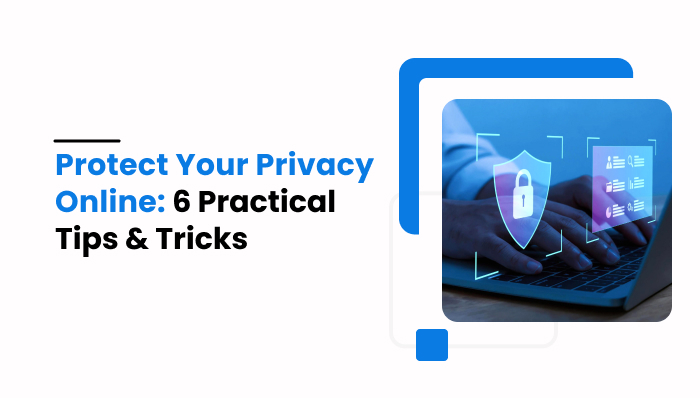6 Practical Tips & Tricks To Protect Your Privacy Online

6 Practical Tips & Tricks To Protect Your Privacy Online
In the new era where almost everything is done online, from serious business transactions to basic entertainment, privacy is a factor that must be prioritized. Digital connectivity can be your ally or foe when it comes to your privacy.
Both personal and financial information are prone to exposure and theft when they land in the wrong hands. Therefore, this post will look into six practical tips and tricks you can use to ensure your privacy online is protected.

1. Use Virtual Private Networks (VPNs)
Virtual private network has many benefits when it comes to online use. It offers protection by providing a faster internet connection with minimal buffering in addition to accessing blocked or restricted networks. Let’s say, for example, you have a PrivateVPN setup for qBittorrent, this tool makes it harder for anyone including hackers, government agencies, and your ISP, to monitor your online activity.
By encrypting your data in transit, virtual private networks (VPNs) shield your identity and private information from prying eyes. A virtual private network (VPN) is always important for protecting your privacy online, but it becomes even more crucial when you use public Wi-Fi networks, which are known to have security holes.
2. Strong and Unique Passwords
Using robust and distinct passwords for all of your accounts is one of the easiest and most effective ways to improve your online privacy. Forget using phrases like “password” or “123456” as your password; instead, use a mix of uppercase and lowercase letters, numbers, and symbols. Create and safely save complicated passwords with the help of a trustworthy password manager. Doing so ensures that your other accounts will be secure if one of them is compromised.
3. Enable Two-Factor Authentication (2FA)
Adding an extra degree of protection, Two-Factor Authentication (2FA) has users produce two pieces of identity before they can access their accounts. Both your knowledge (such as a password) and your possession (such as a code texted to your phone) are usually required for this. Even if your password gets hacked, the risk of unwanted access is much reduced when you enable two-factor authentication (2FA). Use two-factor authentication (2FA) whenever you can; it’s available on a lot of websites and services.
4. Review and Adjust Privacy Settings Regularly
Your personal information may become more or less visible as a result of frequent updates to privacy settings on various online services and social media platforms. Make sure you’re comfortable with the amount of information shared by reviewing and adjusting your privacy settings on platforms like Google, Facebook, and Twitter regularly. Keep third-party app permissions in mind and grant access to only necessary data.
5. Regularly Update Your Software and Apps
Outdated versions of Apps or software are a main target for cybercriminals. This is because there are loopholes that could be used to access the data. Updates are released by software and app developers to fix security issues and offer new features. The best way to protect your computer from vulnerabilities is to always use the most recent versions of your operating system, antivirus programs, and programs. If at all feasible, set your gadgets to automatically update themselves, or at least check for updates frequently. You may greatly strengthen your digital defenses by implementing this straightforward strategy.
6. Be Cautious with Personal Information Sharing
Be careful with the details you share online in this day and age of constant connectivity. Never give out your home address, phone number, or bank account details on a public forum or social media site. Phishing and identity theft are common ways that cybercriminals use this kind of data. Also, exercise caution when opening attachments or clicking on links, particularly if you are not familiar with the sender.
In addition to this, check carefully if the links you receive come from genuine providers. This is because cybercriminals have perfected the act of changing slight details that you can oversight if you are not keen enough. This is how they can access your data or access an organization’s network. Always check the sender’s address and the date of the communication before responding with sensitive information.

It takes a proactive and multi-pronged strategy to protect your privacy when using the internet. You may greatly lessen the likelihood of being a victim of online attacks by implementing the tips and tricks mentioned above. This is because, when your privacy gets into the wrong hands you are likely to suffer identity theft, exposure, and financial losses.
Companies mostly should add an extra layer of security for their customer’s data as any hacking could result in a loss of reputation and costly lawsuits that could put the stability of a company and especially a startup at the edge of closure. For a more secure and risk-free time spent online, it’s important to be alert, educated, and in charge of your digital presence.



 WhatsApp Spy
WhatsApp Spy Facebook & Messenger Spy
Facebook & Messenger Spy Viber Spy
Viber Spy Instagram Spy
Instagram Spy Skype Spy
Skype Spy TikTok Spy
TikTok Spy Telegram Spy
Telegram Spy LinkedIn Spy
LinkedIn Spy Twitter Spy
Twitter Spy Youtube Spy
Youtube Spy Photo Spy
Photo Spy Video Spy
Video Spy Calls and Contacts Tracking
Calls and Contacts Tracking SMS & IM Chats
SMS & IM Chats Voice Capture
Voice Capture Image Capture
Image Capture Video Record
Video Record